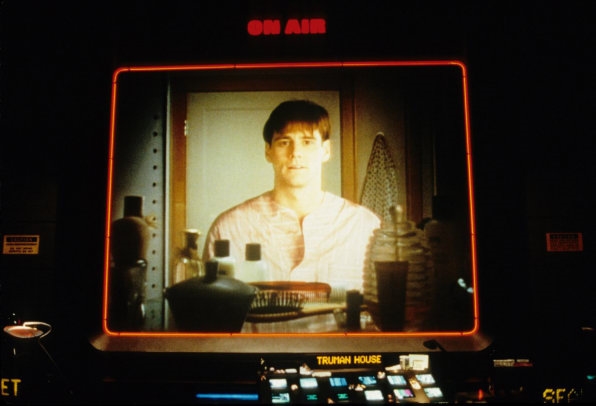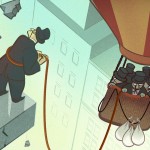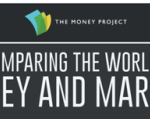You Are Being Exploited By The Opaque, Algorithm-Driven Economy
By Ben Schiller , August 04, 2017
Is internet shopping like The Truman Show–a movie about a man who thinks himself free, but whose life is actually controlled by a TV producer? Are we online consumers like Truman Burbank, hopelessly and blissfully naive while titanic companies control our fate? Are the prices we pay online a function of a competitive market, or are our choices framed in ways we don’t quite fathom?
These provocative questions are posed in a fascinating book about how platform internet companies (Amazon, Facebook, and so on) are changing the norms of economic competition. Virtual Competition: The Promise and Perils of the Algorithm-Driven Economy argues that these companies, with their immense data advantage, are effectively making their own rules in the marketplace, beating back new market entrants, and disadvantaging customers.
As the internet took off in the 1990s, it was said, by some dreamy-eyed commentators, to be a giant-killing, democratic medium–a sort of anti-Walmart. You could start a business from your bedroom. You could win a $100 million in venture capital while still in your bathrobe. The internet was to emancipate commerce and to embody Adam Smith’s “invisible hand”–the beneficial, and mutual, economic effect that comes from people acting aggressively in their own self-interest.

In Virtual Competition, economists Ariel Ezrachi and Maurice Stucke document the subtle ways the invisible hand is becoming what they call a “digitized hand” with platforms playing gatekeeper roles. “The invisible hand of competition was replaced by algorithms that structure an environment that might look exactly the same [as the real world] but in essence are very different,” says Ezrachi, a professor of competition law at the University of Oxford, in an interview. “In the online environment, our reality is manmade. What you see is like The Truman Show.”
Or, as the authors say in the book: “We, like Truman, may think that we’re ordinary consumers with ordinary lives with unremarkable purchases. We have no idea about how, and the extent to which, we are being exploited.”
Traditionally, when companies acted anti-competitively, they formed cartels in back rooms to agree on prices instead of competing to see which could have the most affordable product. On the internet, competition and competition law is perverted in several new ways, Ezrachi and Maurice Stucke argue.
First, computers are trained to track and respond to market conditions. Amazon, with its 80 million Prime subscribers, dynamically adjusts its prices every few minutes to match other retailer’s prices. Uber raises prices in surge periods, allegedly obeying laws of supply and demand on its grid (the balance of drivers and passengers) but in a way that’s opaque to the outside world.
Second, platforms engage in behavioral techniques (“discrimination”) tailoring offerings to different customers. Armed with data about you, they change prices (or discounts) to reflect who is shopping, adjusting based on where you live, when you shop, how often you visit a site, what you’ve bought in the past, and even what device you use. Someone surfing on a MacBook as opposed to an Android smartphone may be charged more.
And third, internet companies co-operate in partnerships online, being both rivals and collaborators (“frenemies”). Ezrachi and Stucke expect companies to deepen their abilities to understand marketplace dynamics, even to the point of predicting what their rivals will do in the future. They sketch a scenario where companies together have a “God-like view” of the market (the phrase is from a mode in the Uber app available to the company) to the point of being able to peer into entire supply chains. They may know that a competitor has ordered extra stock for the Christmas season, and react with their own purchases to keep up.
Moreover, as computers begin to learn-by-doing, they’ll develop the artificial intelligence to automatically adjust prices and offers, effectively taking over some managerial decision-making. The computers will collude by rapidly pricing off one another, in effect fixing prices without human intervention.
These scenarios create problems for traditional competition law because the collusion isn’t necessarily driven by executives who are ultimately accountable. It’s, in some sense, structural. Former Uber CEO Travis Kalanick has summed the perspective of the platform owners and how they can plausibly claim to be removed from their companies’ pricing activities. “We are not setting the price. The market is setting the price . . . We have algorithms to determine what that market is,” he said in 2013 of surge pricing.
Concerns about unaccountable algorithms come at a time when many economists already worry about concentration in the U.S. economy. From transportation to warehousing, the largest companies have gained market share in recent years. The U.S. government has tended to go easy on mega-mergers and, according to distinguished legal observers, given up the mantle of antitrust enforcement. The airline industry is now dominated by just four companies. In telecommunications, about one third of the country now has only one choice of broadband provider. This concentration allows companies to raise prices and freeze out potential competitors, say critics, and it may be a factor in stagnating worker wages and the low rate of new business formation. (This week, Democrats laid a new economic agenda that promises to beef up competition policy).
A new generation of trustbusting intellectuals, mostly on the left, but also on the right, has called for the government to update its views on how competition is promoted, arguing that the internet throws up unprecedented problems. Amazon, for instance, is criticized for its dual role as retailer and marketplace for other merchants. “The concern for small and medium sized enterprises is that if a majority of us are using Amazon, and they are selling on Amazon, it is able to exert market power in its relationships with sellers. It means they use that [power] to sell something directly because they’re vertically integrated and able to push out other sellers,” Ezrachi says.
Amazon is also branching out into the physical world, buying up Whole Foods and developing the Amazon Go concept store. That raises the future question, Ezrachi says, of whether Main Street could become a Truman Show as well. Amazon has long been accused of having too much power in the books market, dictating terms to publishers and having a lot of say over whether a title succeeds or otherwise.
“The greater Amazon’s power, the more profits will remain with them instead of with their suppliers,” Ezrachi says. “If markets become more efficient [and consumers benefit], that’s great. But it could also have an impact on our culture, our neighborhoods, and even, you could argue, on freedom of expression. There’s room for us to be vigilant about how increased consolidation on these platforms can affect our welfare in society.”
(86)













